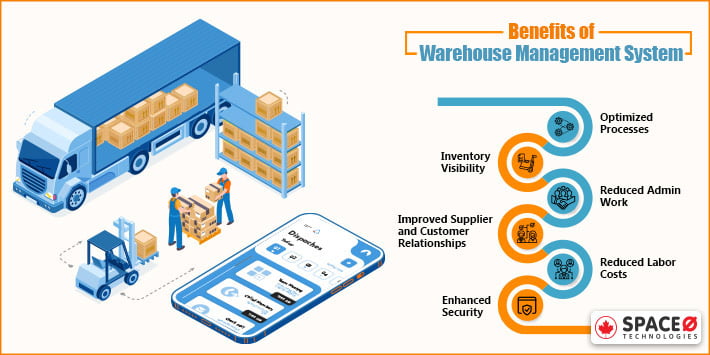The Benefits of Warehouse Management System
A warehouse management system (WMS) is a software application that helps businesses efficiently manage their warehouse operations. In this article, we will explore the various benefits of implementing a WMS in your organization and how it can improve your overall warehouse management processes.
Improved Inventory Management
One of the key benefits of a warehouse management system is improved inventory management. With a WMS, you can accurately track and monitor your inventory levels in real time. This helps prevent stockouts and overstocking, ensuring that you always have the right amount of stock available to fulfill customer orders. By having a clear view of your inventory, you can optimize storage space, reduce carrying costs, and minimize the risk of obsolete inventory.
Enhanced Order Fulfillment
A WMS streamlines the order fulfillment process, resulting in improved efficiency and customer satisfaction. By automating tasks such as order picking, packing, and shipping, a WMS reduces errors and enables faster order processing. With features like barcode scanning and real-time inventory updates, you can ensure accurate and timely order fulfillment, leading to happier customers and repeat business.
Optimized Warehouse Layout
Implementing a WMS allows you to optimize your warehouse layout for maximum efficiency. The system provides insights into product demand, order frequency, and picking patterns, helping you design a layout that minimizes travel time and maximizes productivity. By strategically placing popular items closer to the shipping area and organizing inventory based on order frequency, you can reduce the time and effort required to fulfill orders, ultimately improving overall warehouse performance.
Improved Labor Productivity
A warehouse management system can significantly improve labor productivity by automating manual tasks and reducing reliance on paper-based processes. With features like automated picking lists, task assignments, and real-time performance tracking, a WMS enables your workforce to work more efficiently. By eliminating time-consuming manual processes, your employees can focus on value-added activities, leading to higher productivity levels and reduced labor costs.
Enhanced Accuracy and Traceability
With a WMS, you can achieve greater accuracy and traceability in your warehouse operations. The system tracks every movement of inventory, from receiving to shipping, ensuring accurate stock counts and reducing the risk of errors. In case of product recalls or quality issues, a WMS can quickly trace the affected items, allowing you to take prompt action and minimize potential damage to your brand reputation.
Real-Time Reporting and Analytics
A WMS provides real-time reporting and analytics capabilities, allowing you to make data-driven decisions to optimize your warehouse operations. By analyzing key performance indicators (KPIs) such as order cycle time, picking accuracy, and inventory turnover, you can identify areas for improvement and implement strategies to enhance overall efficiency. With access to comprehensive reports and insights, you can make informed decisions that drive business growth and success.

Implementing a warehouse management system offers numerous benefits for businesses looking to optimize their warehouse operations. From improved inventory management and order fulfillment to optimized warehouse layout and enhanced labor productivity, a WMS can transform your warehouse into a well-oiled machine. By leveraging the power of technology and data, you can gain a competitive edge in the market and deliver exceptional customer experiences.
Frequently Asked Questions
1. What is a warehouse management system (WMS)?
A WMS is a software application that helps manage and control the operations of a warehouse, including inventory management, order fulfillment, and tracking of goods.
2. What are the benefits of implementing a WMS?
Implementing a WMS can provide several benefits such as:
Improved inventory accuracy
Increased efficiency and productivity
Enhanced order fulfillment and accuracy
Optimized space utilization
Reduced labor costs
3. How does a WMS improve inventory accuracy?
A WMS utilizes barcode or RFID technology to track and manage inventory, reducing errors and improving accuracy. It provides real-time visibility into stock levels and locations.
4. Can a WMS help increase efficiency and productivity?
Yes, a WMS automates manual processes, streamlines workflows, and provides real-time data, enabling faster and more efficient operations. It reduces time spent on tasks such as locating items and manual data entry.
5. How does a WMS enhance order fulfillment?
A WMS optimizes order picking and packing processes, reducing errors and improving order accuracy. It ensures timely order fulfillment and enables better customer satisfaction.
6. How does a WMS optimize space utilization?
A WMS provides insights into available space, allowing efficient storage and organization of goods. It helps prevent overstocking or underutilization of warehouse space, maximizing storage capacity.
7. Can a WMS help reduce labor costs?
Yes, a WMS automates various tasks, reducing the need for manual labor. It optimizes labor allocation, improves workforce productivity, and eliminates time wasted on inefficient processes.
8. Does implementing a WMS require significant changes in existing warehouse operations?
Implementing a WMS may require some adjustments in warehouse operations to align with the system’s functionalities. However, experienced WMS providers can assist in smooth integration and minimize disruptions.
9. Can a WMS be integrated with other business systems?
Yes, a WMS can be integrated with other business systems such as ERP (Enterprise Resource Planning) or CRM (Customer Relationship Management) systems to streamline overall operations and data sharing.
10. How can I choose the right WMS for my warehouse?
Choosing the right WMS involves assessing your specific warehouse needs, considering scalability, ease of use, and integration capabilities, and evaluating vendor reputation and customer reviews. Consulting with industry experts can also be beneficial.




